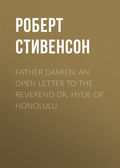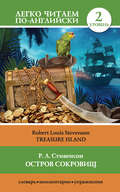
Роберт Льюис Стивенсон
The Black Arrow
CHAPTER III – ST. BRIDE’S CROSS
St. Bride’s cross stood a little way back from Shoreby, on the skirts of Tunstall Forest. Two roads met: one, from Holywood across the forest; one, that road from Risingham down which we saw the wrecks of a Lancastrian army fleeing in disorder. Here the two joined issue, and went on together down the hill to Shoreby; and a little back from the point of junction, the summit of a little knoll was crowned by the ancient and weather-beaten cross.
Here, then, about seven in the morning, Dick arrived. It was as cold as ever; the earth was all grey and silver with the hoarfrost, and the day began to break in the east with many colours of purple and orange.
Dick set him down upon the lowest step of the cross, wrapped himself well in his tabard, and looked vigilantly upon all sides. He had not long to wait. Down the road from Holywood a gentleman in very rich and bright armour, and wearing over that a surcoat of the rarest furs, came pacing on a splendid charger. Twenty yards behind him followed a clump of lances; but these halted as soon as they came in view of the trysting-place, while the gentleman in the fur surcoat continued to advance alone.
His visor was raised, and showed a countenance of great command and dignity, answerable to the richness of his attire and arms. And it was with some confusion of manner that Dick arose from the cross and stepped down the bank to meet his prisoner.
“I thank you, my lord, for your exactitude,” he said, louting very low. “Will it please your lordship to set foot to earth?”
“Are ye here alone, young man?” inquired the other,
“I was not so simple,” answered Dick; “and, to be plain with your lordship, the woods upon either hand of this cross lie full of mine honest fellows lying on their weapons.”
“Y’ ’ave done wisely,” said the lord. “It pleaseth me the rather, since last night ye fought foolhardily, and more like a salvage Saracen lunatic than any Christian warrior. But it becomes not me to complain that had the undermost.”
“Ye had the undermost indeed, my lord, since ye so fell,” returned Dick; “but had the waves not holpen me, it was I that should have had the worst. Ye were pleased to make me yours with several dagger marks, which I still carry. And in fine, my lord, methinks I had all the danger, as well as all the profit, of that little blind-man’s mellay on the beach.”
“Y’ are shrewd enough to make light of it, I see,” returned the stranger.
“Nay, my lord, not shrewd,” replied Dick, “in that I shoot at no advantage to myself. But when, by the light of this new day, I see how stout a knight hath yielded, not to my arms alone, but to fortune, and the darkness, and the surf – and how easily the battle had gone otherwise, with a soldier so untried and rustic as myself – think it not strange, my lord, if I feel confounded with my victory.”
“Ye speak well,” said the stranger. “Your name?”
“My name, an’t like you, is Shelton,” answered Dick.
“Men call me the Lord Foxham,” added the other.
“Then, my lord, and under your good favour, ye are guardian to the sweetest maid in England,” replied Dick; “and for your ransom, and the ransom of such as were taken with you on the beach, there will be no uncertainty of terms. I pray you, my lord, of your goodwill and charity, yield me the hand of my mistress, Joan Sedley; and take ye, upon the other part, your liberty, the liberty of these your followers, and (if ye will have it) my gratitude and service till I die.”
“But are ye not ward to Sir Daniel? Methought, if y’ are Harry Shelton’s son, that I had heard it so reported,” said Lord Foxham.
“Will it please you, my lord, to alight? I would fain tell you fully who I am, how situate, and why so bold in my demands. Beseech you, my lord, take place upon these steps, hear me to a full end, and judge me with allowance.”
And so saying, Dick lent a hand to Lord Foxham to dismount; led him up the knoll to the cross; installed him in the place where he had himself been sitting; and standing respectfully before his noble prisoner, related the story of his fortunes up to the events of the evening before.
Lord Foxham listened gravely, and when Dick had done, “Master Shelton,” he said, “ye are a most fortunate-unfortunate young gentleman; but what fortune y’ ’ave had, that ye have amply merited; and what unfortune, ye have noways deserved. Be of a good cheer; for ye have made a friend who is devoid neither of power nor favour. For yourself, although it fits not for a person of your birth to herd with outlaws, I must own ye are both brave and honourable; very dangerous in battle, right courteous in peace; a youth of excellent disposition and brave bearing. For your estates, ye will never see them till the world shall change again; so long as Lancaster hath the strong hand, so long shall Sir Daniel enjoy them for his own. For my ward, it is another matter; I had promised her before to a gentleman, a kinsman of my house, one Hamley; the promise is old – ”
“Ay, my lord, and now Sir Daniel hath promised her to my Lord Shoreby,” interrupted Dick. “And his promise, for all it is but young, is still the likelier to be made good.”
“’Tis the plain truth,” returned his lordship. “And considering, moreover, that I am your prisoner, upon no better composition than my bare life, and over and above that, that the maiden is unhappily in other hands, I will so far consent. Aid me with your good fellows” -
“My lord,” cried Dick, “they are these same outlaws that ye blame me for consorting with.”
“Let them be what they will, they can fight,” returned Lord Foxham. “Help me, then; and if between us we regain the maid, upon my knightly honour, she shall marry you!”
Dick bent his knee before his prisoner; but he, leaping up lightly from the cross, caught the lad up and embraced him like a son.
“Come,” he said, “an y’ are to marry Joan, we must be early friends.”
CHAPTER IV – THE GOOD HOPE
An hour thereafter, Dick was back at the Goat and Bagpipes, breaking his fast, and receiving the report of his messengers and sentries. Duckworth was still absent from Shoreby; and this was frequently the case, for he played many parts in the world, shared many different interests, and conducted many various affairs. He had founded that fellowship of the Black Arrow, as a ruined man longing for vengeance and money; and yet among those who knew him best, he was thought to be the agent and emissary of the great King-maker of England, Richard, Earl of Warwick.
In his absence, at any rate, it fell upon Richard Shelton to command affairs in Shoreby; and, as he sat at meat, his mind was full of care, and his face heavy with consideration. It had been determined, between him and the Lord Foxham, to make one bold stroke that evening, and, by brute force, to set Joanna free. The obstacles, however, were many; and as one after another of his scouts arrived, each brought him more discomfortable news.
Sir Daniel was alarmed by the skirmish of the night before. He had increased the garrison of the house in the garden; but not content with that, he had stationed horsemen in all the neighbouring lanes, so that he might have instant word of any movement. Meanwhile, in the court of his mansion, steeds stood saddled, and the riders, armed at every point, awaited but the signal to ride.
The adventure of the night appeared more and more difficult of execution, till suddenly Dick’s countenance lightened.
“Lawless!” he cried, “you that were a shipman, can ye steal me a ship?”
“Master Dick,” replied Lawless, “if ye would back me, I would agree to steal York Minster.”
Presently after, these two set forth and descended to the harbour. It was a considerable basin, lying among sand hills, and surrounded with patches of down, ancient ruinous lumber, and tumble-down slums of the town. Many decked ships and many open boats either lay there at anchor, or had been drawn up on the beach. A long duration of bad weather had driven them from the high seas into the shelter of the port; and the great trooping of black clouds, and the cold squalls that followed one another, now with a sprinkling of dry snow, now in a mere swoop of wind, promised no improvement but rather threatened a more serious storm in the immediate future.
The seamen, in view of the cold and the wind, had for the most part slunk ashore, and were now roaring and singing in the shoreside taverns. Many of the ships already rode unguarded at their anchors; and as the day wore on, and the weather offered no appearance of improvement, the number was continually being augmented. It was to these deserted ships, and, above all, to those of them that lay far out, that Lawless directed his attention; while Dick, seated upon an anchor that was half embedded in the sand, and giving ear, now to the rude, potent, and boding voices of the gale, and now to the hoarse singing of the shipmen in a neighbouring tavern, soon forgot his immediate surroundings and concerns in the agreeable recollection of Lord Foxham’s promise.
He was disturbed by a touch upon his shoulder. It was Lawless, pointing to a small ship that lay somewhat by itself, and within but a little of the harbour mouth, where it heaved regularly and smoothly on the entering swell. A pale gleam of winter sunshine fell, at that moment, on the vessel’s deck, relieving her against a bank of scowling cloud; and in this momentary glitter Dick could see a couple of men hauling the skiff alongside.
“There, sir,” said Lawless, “mark ye it well! There is the ship for to-night.”
Presently the skiff put out from the vessel’s side, and the two men, keeping her head well to the wind, pulled lustily for shore. Lawless turned to a loiterer.
“How call ye her?” he asked, pointing to the little vessel.
“They call her the Good Hope, of Dartmouth,” replied the loiterer. “Her captain, Arblaster by name. He pulleth the bow oar in yon skiff.”
This was all that Lawless wanted. Hurriedly thanking the man, he moved round the shore to a certain sandy creek, for which the skiff was heading. There he took up his position, and as soon as they were within earshot, opened fire on the sailors of the Good Hope.
“What! Gossip Arblaster!” he cried. “Why, ye be well met; nay, gossip, ye be right well met, upon the rood! And is that the Good Hope? Ay, I would know her among ten thousand! – a sweet shear, a sweet boat! But marry come up, my gossip, will ye drink? I have come into mine estate which doubtless ye remember to have heard on. I am now rich; I have left to sail upon the sea; I do sail now, for the most part, upon spiced ale. Come, fellow; thy hand upon ’t! Come, drink with an old shipfellow!”
Skipper Arblaster, a long-faced, elderly, weather-beaten man, with a knife hanging about his neck by a plaited cord, and for all the world like any modern seaman in his gait and bearing, had hung back in obvious amazement and distrust. But the name of an estate, and a certain air of tipsified simplicity and good-fellowship which Lawless very well affected, combined to conquer his suspicious jealousy; his countenance relaxed, and he at once extended his open hand and squeezed that of the outlaw in a formidable grasp.
“Nay,” he said, “I cannot mind you. But what o’ that? I would drink with any man, gossip, and so would my man Tom. Man Tom,” he added, addressing his follower, “here is my gossip, whose name I cannot mind, but no doubt a very good seaman. Let’s go drink with him and his shore friend.”
Lawless led the way, and they were soon seated in an alehouse, which, as it was very new, and stood in an exposed and solitary station, was less crowded than those nearer to the centre of the port. It was but a shed of timber, much like a blockhouse in the backwoods of to-day, and was coarsely furnished with a press or two, a number of naked benches, and boards set upon barrels to play the part of tables. In the middle, and besieged by half a hundred violent draughts, a fire of wreck-wood blazed and vomited thick smoke.
“Ay, now,” said Lawless, “here is a shipman’s joy – a good fire and a good stiff cup ashore, with foul weather without and an off-sea gale a-snoring in the roof! Here’s to the Good Hope! May she ride easy!”
“Ay,” said Skipper Arblaster, “’tis good weather to be ashore in, that is sooth. Man Tom, how say ye to that? Gossip, ye speak well, though I can never think upon your name; but ye speak very well. May the Good Hope ride easy! Amen!”
“Friend Dickon,” resumed Lawless, addressing his commander, “ye have certain matters on hand, unless I err? Well, prithee be about them incontinently. For here I be with the choice of all good company, two tough old shipmen; and till that ye return I will go warrant these brave fellows will bide here and drink me cup for cup. We are not like shore-men, we old, tough tarry-Johns!”
“It is well meant,” returned the skipper. “Ye can go, boy; for I will keep your good friend and my good gossip company till curfew – ay, and by St. Mary, till the sun get up again! For, look ye, when a man hath been long enough at sea, the salt getteth me into the clay upon his bones; and let him drink a draw-well, he will never be quenched.”
Thus encouraged upon all hands, Dick rose, saluted his company, and going forth again into the gusty afternoon, got him as speedily as he might to the Goat and Bagpipes. Thence he sent word to my Lord Foxham that, so soon as ever the evening closed, they would have a stout boat to keep the sea in. And then leading along with him a couple of outlaws who had some experience of the sea, he returned himself to the harbour and the little sandy creek.
The skiff of the Good Hope lay among many others, from which it was easily distinguished by its extreme smallness and fragility. Indeed, when Dick and his two men had taken their places, and begun to put forth out of the creek into the open harbour, the little cockle dipped into the swell and staggered under every gust of wind, like a thing upon the point of sinking.
The Good Hope, as we have said, was anchored far out, where the swell was heaviest. No other vessel lay nearer than several cables’ length; those that were the nearest were themselves entirely deserted; and as the skiff approached, a thick flurry of snow and a sudden darkening of the weather further concealed the movements of the outlaws from all possible espial. In a trice they had leaped upon the heaving deck, and the skiff was dancing at the stern. The Good Hope was captured.
She was a good stout boat, decked in the bows and amidships, but open in the stern. She carried one mast, and was rigged between a felucca and a lugger. It would seem that Skipper Arblaster had made an excellent venture, for the hold was full of pieces of French wine; and in the little cabin, besides the Virgin Mary in the bulkhead which proved the captain’s piety, there were many lockfast chests and cupboards, which showed him to be rich and careful.
A dog, who was the sole occupant of the vessel, furiously barked and bit the heels of the boarders; but he was soon kicked into the cabin, and the door shut upon his just resentment. A lamp was lit and fixed in the shrouds to mark the vessel clearly from the shore; one of the wine pieces in the hold was broached, and a cup of excellent Gascony emptied to the adventure of the evening; and then, while one of the outlaws began to get ready his bow and arrows and prepare to hold the ship against all comers, the other hauled in the skiff and got overboard, where he held on, waiting for Dick.
“Well, Jack, keep me a good watch,” said the young commander, preparing to follow his subordinate. “Ye will do right well.”
“Why,” returned Jack, “I shall do excellent well indeed, so long as we lie here; but once we put the nose of this poor ship outside the harbour – See, there she trembles! Nay, the poor shrew heard the words, and the heart misgave her in her oak-tree ribs. But look, Master Dick! how black the weather gathers!”
The darkness ahead was, indeed, astonishing. Great billows heaved up out of the blackness, one after another; and one after another the Good Hope buoyantly climbed, and giddily plunged upon the further side. A thin sprinkle of snow and thin flakes of foam came flying, and powdered the deck; and the wind harped dismally among the rigging.
“In sooth, it looketh evilly,” said Dick. “But what cheer! ’Tis but a squall, and presently it will blow over.” But, in spite of his words, he was depressingly affected by the bleak disorder of the sky and the wailing and fluting of the wind; and as he got over the side of the Good Hope and made once more for the landing-creek with the best speed of oars, he crossed himself devoutly, and recommended to Heaven the lives of all who should adventure on the sea.
At the landing-creek there had already gathered about a dozen of the outlaws. To these the skiff was left, and they were bidden embark without delay.
A little further up the beach Dick found Lord Foxham hurrying in quest of him, his face concealed with a dark hood, and his bright armour covered by a long russet mantle of a poor appearance.
“Young Shelton,” he said, “are ye for sea, then, truly?”
“My lord,” replied Richard, “they lie about the house with horsemen; it may not be reached from the land side without alarum; and Sir Daniel once advertised of our adventure, we can no more carry it to a good end than, saving your presence, we could ride upon the wind. Now, in going round by sea, we do run some peril by the elements; but, what much outweighteth all, we have a chance to make good our purpose and bear off the maid.”
“Well,” returned Lord Foxham, “lead on. I will, in some sort, follow you for shame’s sake; but I own I would I were in bed.”
“Here, then,” said Dick. “Hither we go to fetch our pilot.”
And he led the way to the rude alehouse where he had given rendezvous to a portion of his men. Some of these he found lingering round the door outside; others had pushed more boldly in, and, choosing places as near as possible to where they saw their comrade, gathered close about Lawless and the two shipmen. These, to judge by the distempered countenance and cloudy eye, had long since gone beyond the boundaries of moderation; and as Richard entered, closely followed by Lord Foxham, they were all three tuning up an old, pitiful sea-ditty, to the chorus of the wailing of the gale.
The young leader cast a rapid glance about the shed. The fire had just been replenished, and gave forth volumes of black smoke, so that it was difficult to see clearly in the further corners. It was plain, however, that the outlaws very largely outnumbered the remainder of the guests. Satisfied upon this point, in case of any failure in the operation of his plan, Dick strode up to the table and resumed his place upon the bench.
“Hey?” cried the skipper, tipsily, “who are ye, hey?”
“I want a word with you without, Master Arblaster,” returned Dick; “and here is what we shall talk of.” And he showed him a gold noble in the glimmer of the firelight.
The shipman’s eyes burned, although he still failed to recognise our hero.
“Ay, boy,” he said, “I am with you. Gossip, I will be back anon. Drink fair, gossip;” and, taking Dick’s arm to steady his uneven steps, he walked to the door of the alehouse.
As soon as he was over the threshold, ten strong arms had seized and bound him; and in two minutes more, with his limbs trussed one to another, and a good gag in his mouth, he had been tumbled neck and crop into a neighbouring hay-barn. Presently, his man Tom, similarly secured, was tossed beside him, and the pair were left to their uncouth reflections for the night.
And now, as the time for concealment had gone by, Lord Foxham’s followers were summoned by a preconcerted signal, and the party, boldly taking possession of as many boats as their numbers required, pulled in a flotilla for the light in the rigging of the ship. Long before the last man had climbed to the deck of the Good Hope, the sound of furious shouting from the shore showed that a part, at least, of the seamen had discovered the loss of their skiffs.
But it was now too late, whether for recovery or revenge. Out of some forty fighting men now mustered in the stolen ship, eight had been to sea, and could play the part of mariners. With the aid of these, a slice of sail was got upon her. The cable was cut. Lawless, vacillating on his feet, and still shouting the chorus of sea-ballads, took the long tiller in his hands: and the Good Hope began to flit forward into the darkness of the night, and to face the great waves beyond the harbour bar.
Richard took his place beside the weather rigging. Except for the ship’s own lantern, and for some lights in Shoreby town, that were already fading to leeward, the whole world of air was as black as in a pit. Only from time to time, as the Good Hope swooped dizzily down into the valley of the rollers, a crest would break – a great cataract of snowy foam would leap in one instant into being – and, in an instant more, would stream into the wake and vanish.
Many of the men lay holding on and praying aloud; many more were sick, and had crept into the bottom, where they sprawled among the cargo. And what with the extreme violence of the motion, and the continued drunken bravado of Lawless, still shouting and singing at the helm, the stoutest heart on board may have nourished a shrewd misgiving as to the result.
But Lawless, as if guided by an instinct, steered the ship across the breakers, struck the lee of a great sandbank, where they sailed for awhile in smooth water, and presently after laid her alongside a rude, stone pier, where she was hastily made fast, and lay ducking and grinding in the dark.







